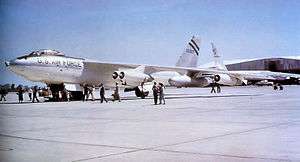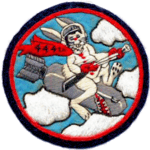444th Air Expeditionary Squadron
| 444th Air Expeditionary Squadron | |
|---|---|
 320th Bombardment Wing B-47 Stratojet[note 1] | |
| Active | 1942–1945; 1947–1949; 1958–1960 |
| Country |
|
| Branch |
|
| Role | Expeditionary Support |
| Part of | Air Combat Command |
| Engagements | Mediterranean Theater of Operations[1] |
| Decorations |
Distinguished Unit Citation French Croix de Guerre with Palm[1] |
| Insignia | |
| Patch with 444th Bombardment Squadron emblem (World War II)[2] |
 |
The 444th Bombardment Squadron is an inactive United States Air Force unit. Its last was assigned to the 320th Bombardment Wing, stationed at March Air Force Base, California. It was inactivated on 15 September 1960.
History
World War II

Established in mid-1942 as a Martin B-26 Marauder medium bomber group. Trained under Third Air Force in Florida, deployed to England under the VIII Air Support Command, 3d Bombardment Wing.
Operated against targets on the continent during early fall of 1942; deployed to North Africa as part of Twelfth Air Force after Operation Torch landings in Algeria in November. Flew tactical bombing missions against Axis forces in North Africa until the end of the Tunisian Campaign in May 1943. Participated in the Sicilian and Italian Campaigns; liberation of Corsica and Sardinia and the Invasion of Southern France. Supported Allied ground forces in the Western Allied Invasion of Germany, spring 1945 and becoming part of the United States Air Forces in Europe Army of Occupation in Germany, fall 1945. Personnel demobilized in Germany and the squadron inactivated as a paper unit in December 1945.
Reserves
Reactivated in the reserves in 1947. Never manned or equipped.
Strategic Air Command
From 1958, the Boeing B-47 Stratojet wings of Strategic Air Command (SAC) began to assume an alert posture at their home bases, reducing the amount of time spent on alert at overseas bases. The SAC alert cycle divided itself into four parts: planning, flying, alert and rest to meet General Thomas S. Power’s initial goal of maintaining one third of SAC’s planes on fifteen minute ground alert, fully fueled and ready for combat to reduce vulnerability to a Soviet missile strike.[3] To implement this new system B-47 wings reorganized from three to four squadrons.[3][4] The 444th was activated at March Air Force Base as the fourth squadron of the 320th Bombardment Wing.[1] In September, the phaseout of the B-47 be accelerated resulted in the squadron and 320th Wing being inactivated on 15 September 1960, with the aircraft were sent to AMARC storage at Davis-Monthan.
Lineage
- Constituted 444th Bombardment Squadron (Medium) on 19 June 1942
- Activated on 1 July 1942
- Redesignated 444th Bombardment Squadron, Medium on 9 October 1944
- Inactivated on 8 December 1945
- Redesignated 444th Bombardment Squadron, Light on 26 May 1947
- Activated in the reserve on 9 July 1947
- Inactivated on 27 June 1949
- Redesignated 444th Bombardment Squadron, Medium on 6 October 1958
- Activated on 1 January 1959
- Discontinued on 15 September 1960[1]
Assignments
- 320th Bombardment Group, 1 July 1942 – 4 December 1945
- 320th Bombardment Group, 9 July 1947 – 27 June 1949
- 320th Bombardment Wing, 1 January 1959 – 15 September 1960[1]
Stations
|
|
Aircraft
- Martin B-26 Marauder, 1942–1945
- Boeing B-47 Stratojet, 1959–1960[1]
References
- Notes
- Citations
- 1 2 3 4 5 6 7 Robertson, Patsy (August 22, 2011). "Factsheet 444 Air Expeditionary Squadron (ACC)". Air Force Historical Research Agency. Retrieved July 4, 2017.
- ↑ Watkins, pp. 84-85
- 1 2 Schake, p. 220 (note 43)
- ↑ "Abstract (Unclassified), History of the Strategic Bomber since 1945 (Top Secret, downgraded to Secret)". Air Force History Index. 1 April 1975. Retrieved March 4, 2014.
- 1 2 Station number in Anderson.
- 1 2 3 4 Station number in Johnson.
Bibliography
![]()
- Anderson, Capt. Barry (1985). Army Air Forces Stations: A Guide to the Stations Where U.S. Army Air Forces Personnel Served in the United Kingdom During World War II (PDF). Maxwell AFB, AL yes: Research Division, USAF Historical Research Center. Archived from the original (PDF) on January 23, 2016. Retrieved June 28, 2017.
- Johnson, 1st Lt. David C. (1988). U.S. Army Air Forces Continental Airfields (ETO) D-Day to V-E Day (PDF). Maxwell AFB, AL: Research Division, USAF Historical Research Center. Archived from the original (PDF) on September 29, 2015. Retrieved June 26, 2017.
- Maurer, Maurer, ed. (1983) [1961]. Air Force Combat Units of World War II (PDF) (reprint ed.). Washington, DC: Office of Air Force History. ISBN 0-912799-02-1. LCCN 61060979. Retrieved December 17, 2016.
- Maurer, Maurer, ed. (1982) [1969]. Combat Squadrons of the Air Force, World War II (PDF) (reprint ed.). Washington, DC: Office of Air Force History. ISBN 0-405-12194-6. LCCN 70605402. OCLC 72556. Retrieved December 17, 2016.
- Ravenstein, Charles A. (1984). Air Force Combat Wings, Lineage & Honors Histories 1947-1977 (PDF). Washington, DC: Office of Air Force History. ISBN 0-912799-12-9. Retrieved December 17, 2016.
- Schake, Col Kurt W. (1998). Strategic Frontier: American Bomber Bases Overseas, 1950-1960 (PDF). Trondheim, Norway: Norwegian University of Science and Technology. ISBN 978-8277650241. Retrieved July 27, 2015.
- Watkins, Robert A. (2009). Insignia and Aircraft Markings of the U.S. Army Air Force In World War II. Volume IV, European-African-Middle Eastern Theater of Operations. Atglen,PA: Shiffer Publishing, Ltd. ISBN 978-0-7643-3401-6.